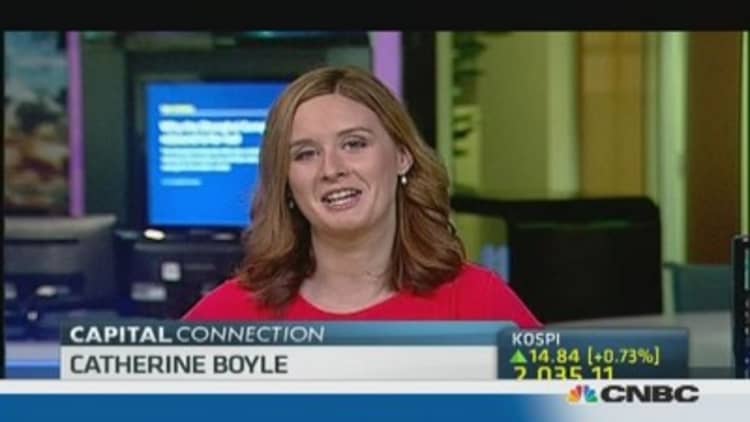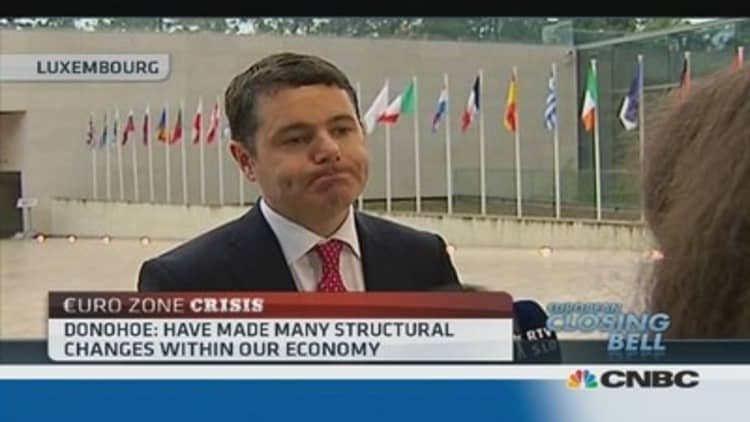Ireland's government is preparing to soften its line on austerity in Tuesday's budget, despite warnings from inside and outside the country that it would be better to stick to its targets.
Taoiseach (Prime Minister) Enda Kenny triumphantly declared an end to the "era of the bailout" on Saturday. He said Ireland will become the first euro zone country to finish its bailout in mid-December and it may even do so without a financing backstop from the rest of Europe.
Not everyone is as confident about Ireland's economic future as him.
The government has already put forward its budget to the troika of international creditors -- the International Monetary Fund (IMF), its fellow euro nations and the European Central Bank. It is planning to put through 2.5 billion euros ($3.4 billion) worth of tax hikes and spending cuts, rather than the planned 3.1 billion euros, according to Arthur Spring, a member of one of the parties which makes up the coalition government.
The IMF has warned that Ireland will still have to make up the total 5.1 billion euro adjustment over two years, which has already been agreed. So it could end up either having to make more than the planned 2 billion adjustment next year – or even more if the country's growth does not proceed according to plan.
(Read more: Ireland's latest austerity cut: Its government)
The national body set up to monitor Ireland's finances in 2011, the Fiscal Advisory Council, said Wednesday that it is not OK with a softer budget.
"This could be short-term gain for long-term pain," Philip O'Sullivan, chief economist at Investec Ireland, told CNBC.
"You shouldn't take any risks. Ireland is not out of the woods."
Ireland was bailed out to the tune of 85 billion euros in 2010 when it could no longer afford to support its stricken banking sector.
(Read more: ECB's Asmussen says Ireland must keep to austerity)

The relatively small economy is reliant on bigger countries to get back to growth, so any threat of a deepening crisis in the euro zone or U.K. – or even the U.S. – could set it back. Ireland is still running a day-to-day deficit of more than 2000 euros for every member of the population.
"That is an unsustainable position and the government needs to narrow the deficit to something more sustainable, particularly given that next year we will be expected to fund our own way," O'Sullivan said.
Ireland is sitting on around 25 billion euros of debt which it has drawn down from the troika bailout without needing to spend it yet. If this is repaid, which is by no means certain as it may be needed to fund future deficits, the country's debt as a proportion of its economy would fall to closer to 107 percent, which is closer to the rest of the euro zone.
If the revisions to the budget do not go through, it will mark a serious challenge to the coalition government.
Kenny has already suffered the embarrassment of the failure to push through his planned abolition of the Seanad, Ireland's upper house of parliament.
(Read more:)

The government has also not yet made clear whether the 600 million euros reduction will come from reduced spending cuts, or not putting through planned tax rises. However, economists based in Dublin believe that the ratio of spending cuts to tax increases, which is supposed to come in at around 2:1, may end up being more like 50/50, with an emphasis on fewer tax increases.
As Ireland prepares to exit the troika bailout and go back to the bond markets for funding in 2014, analysts and economists are concerned that anything which could damage its reputation as a poster boy for austerity may spook the markets.
"We can just try to remain competitive and hope the international recovery gathers steam," O'Sullivan said.
"We can't guarantee that the markets' current supportive attitude will continue."
- By Catherine Boyle, CNBC. Twitter: @cboylecnbc.


